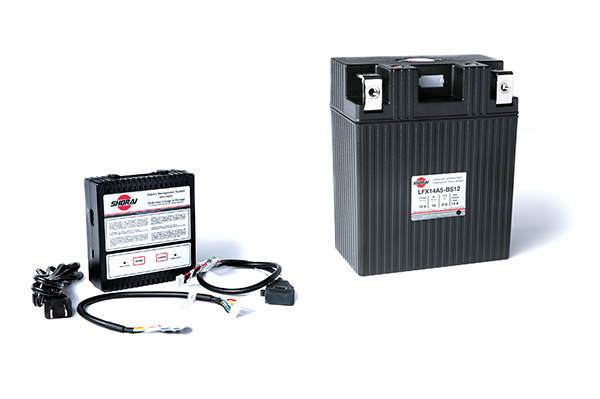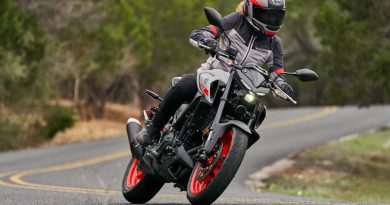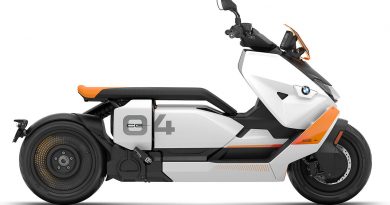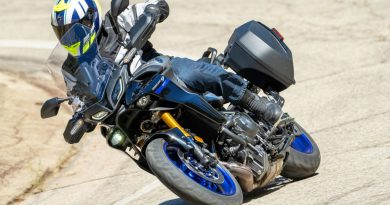Shorai Lithium LFX Battery and Charger | Gear Review
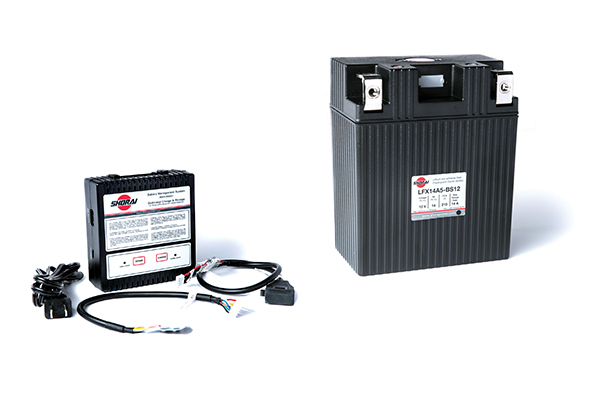
By now most of us know the chief advantages of lithium motorcycle batteries – much less weight than lead-acid batteries, slower discharge and no sulfation from sitting being the top three. Of course, lithium (technically lithium iron phosphate, or LiFePO4) batteries are still quite expensive, so most riders simply take the cheaper path when it’s time to replace. That was my intent when I started looking for a battery for my 1982 Yamaha Seca XJ650, but as with some of my other old bikes the choices are very limited. I certainly didn’t want one of the flooded (conventional) batteries available – having to maintain water levels in a battery on a maintenance charger is a pain – and the one maintenance-free AGM battery I could buy was the same one that I was replacing, which only lasted two years.
Which brings me to a fourth, lesser-known advantage of lithium batteries – you can almost always find one that will work in your bike, even vintage machines like my Seca. With four times more capacity per cell than a lead-acid battery, a lithium battery can be smaller than stock and still pack the cranking power your bike needs. As long as the positive and negative terminals are in the right places and the bolt holes are correctly oriented, you can find one to fit in your bike’s battery box, perhaps with some padding around it to snug it in place. The only limitation may be if your older bike’s charging system doesn’t put out enough juice to keep the LiFePO4 battery charged – at least 13.1 volts at idle and 13.6 at speed.
Shorai makes nearly two-dozen 12- and 6-volt lithium batteries in a variety of case shapes and sizes, capacities and right/left polarity options to fit street, dirt, touring and cruiser motorcycles, scooters and ATVs. They can also be used for custom bikes up to 110ci or 1,800cc, and vintage machines. Turns out the Shorai LFX14A5-BS12 battery for my Seca is a perfect fit in its battery box and didn’t need any padding, but it still came with several square feet of self-adhesive foam in different thicknesses for other battery boxes. LFX batteries come with bolt holes on the top and sides of the terminals, so installation was a snap, and the best part is that the 2.3-pound Shorai LFX14A5-BS12 is 4.5 pounds lighter than the lead-acid YB12A-A that came out of the bike.
Lithium batteries offer several other advantages. In addition to operating at a higher voltage than lead-acid (so they can potentially provide faster cranking and easier starts), in older bikes with no parasitic battery drain from clocks, computers, alarms, etc., the Shorai can hold a charge up to a year. On later machines, if you don’t ride it at least twice a month, then you should charge the battery every few weeks. Shorai recommends using its BMS01 charger because it offers Charge, Store and Diagnosis modes, balances the cells individually for peak performance and can be used long-term. But Shorai’s LFX batteries can also be charged with a regular maintenance charger with automatic cutoff as long as the battery is disconnected from the charger once it’s fully charged.
Shorai LFX batteries range in retail price from $99.95 to $329.95 and come with a limited 5-year pro-rated warranty. The BMS01 charger goes for $99.95.
For more information, see your dealer or visit shoraipower.com.
The post Shorai Lithium LFX Battery and Charger | Gear Review first appeared on Rider Magazine.

